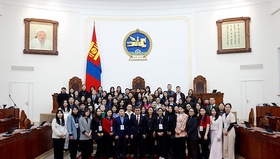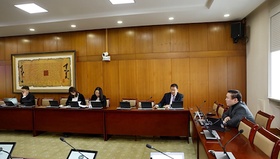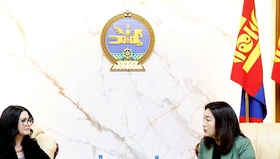Following the welcome address by G.Zandanshatar, Chairman ofthe State Great Hural of Mongolia, the IPU President Ms. Gabriela Cuevas Barondelivered the IPU Statement on the Second Regional Seminar on the SDGs for theParliaments of Asia-Pacific.
Ulaanbaatar, 27 May 2019
The honorable Chairman of the State Great Hural
Your Excellency the Prime Minister of Mongolia,
Fellow parliamentarians,
Ladies and gentlemen,
It is an honor for me to address you at the beginning ofthis important regional seminar. I am very pleased to be here in Mongolia withyou today and to welcome you all to this meeting on behalf of the IPU.
Let me start by thanking the Parliament of Mongolia, inparticular its Speaker, Mr. Gombojav Zandanshatar, for the wonderful work donein organizing this meeting and for receiving us with such warm hospitality.Mongolia has been a member of IPU since 1962, close to 60 years. We aregrateful for their contribution to our organization and look forward to ourcontinued collaboration.
For those of you who may not be familiar with the IPU, allowme to give a brief overview of our unique organization. The IPU is the globalorganization of parliaments. It was founded in 1889 by two visionaries – theFrenchman Frederic Passy and Englishman William Randall Cremer. They bothreceived the Nobel Peace Prize at the beginning of last century. They wereconvinced of the value of political dialogue and the peaceful resolution ofconflicts. Their vision certainly seems as valid today as it was back then.
This year, the IPU celebrates its 130th anniversary. 130years of working for peace, reconciliation, human rights and equality. Today we are more motivated than ever tocontinue to support the development of effective and inclusive parliaments thatreflect and represent women, young people, ethnic minorities and other segmentsof society. Since 2015 we have worked with parliamentarians on the SustainableDevelopment Goals – the SDGs, which is of course why we find ourselves heretoday.
Ladies and Gentlemen,
The IPU regional seminars provide an opportunity for theparliaments all over the world to work together to effectively engage with theSDGs. Your presence here sends a strong message about your commitment, and thecommitment of your parliaments, to the SDGs. IPU is proud to facilitateexchanges of good practices and experiences among parliamentarians at alllevels in order to inspire action and maximize the contribution of parliamentsto the implementation of the goals.
At the previous seminar for the Asia Pacific region, held inViet Nam in 2017, the IPU and UNDP launched the ‘Parliaments and theSustainable Development Goals Self-Assessment Toolkit”. This toolkit enablesparliaments to assess how they are engaging with the SDGS at the nationallevel. The toolkit has been well received and since its launch it has beentranslated into 12 languages. We will have an opportunity to hear more aboutthe results of this toolkit in the first session of the seminar.
In Viet Nam our discussions focused on climate change, andwe agreed that parliaments must do all they can to mitigate its devastatingeffects. We recognized climate change disproportionately affects vulnerablegroups in society, such as women and children. We acknowledged that our role asparliamentarians is to drive change at the national level. Our functions allowus to translate the SDGs into enforceable domestic law, hold governmentsaccountable and align budgets with national sustainable development plans.
This seminar will build on the discussions from 2017 and willpay attention to climate change, health and equality in the context of the AsiaPacific region.
The Asia-Pacific region has experienced rapid economicgrowth in a relatively short amount of time. In fact, the region contributes totwo thirds of global growth. According to a report published by the World Bankin 2018, over the past 2 decades, more than 40 per cent of the region’spopulation has been lifted out of poverty.
The region has also made noteworthy progress on reducingnewborn deaths; improving nutrition; scaling up school enrolment; working toend child marriage; promoting sanitation and hygiene practices; and combatingepidemics.
However many people, in particular women, remain leftbehind. If we are to achieve the inclusive, transformational change envisionedby the SDGs, we must invest in policies and programs that improve the healthand quality of life of all and in particular of women, children and adolescents.Such an investment promises to transform communities and nations forgenerations.
Climate change also remains a serious threat to theAsia-Pacific region. According to statistics released by the Asian DevelopmentBank in 2017, in the 10 year period between 2007 and 2016, the average annualdamage caused by disasters in Asia and the pacific was $48.7 billion.
Disaster risk reduction is an important investment for thisregion. In 2017 the Asian DevelopmentBank released data that showed in a 20 year period Asia and the Pacificexperienced over 320 earthquakes that reached 4.0 or more on the Richter scale.These earthquakes affected over 103 million people, caused damages totalingover $136 billion and the deaths of over 445 thousand people.
These figures are alarming. We must employ our legislative,budgetary and oversight powers to ensure the prioritization of these issues atnational and regional levels.
The Asia Pacific region is home to more than a half of theworld’s population. As parliamentarians, we have a critical role to play toensure that government actions are inclusive and transformative for those whomwe represent. The SDGs cannot be achieved if certain groups in society areignored. They are for everyone.
Dear colleagues,
Over the next few days you will address a wide range oftopics that will help you engage effectively with the SDGs. It is my hope thatthis seminar will provide you with an opportunity to exchange views, shareexperiences and identify common strategies to integrate the SDGs in the work ofyour parliaments, and scale up the resources and political commitment toregional cooperation.
I believe this seminar will produce valuable recommendationsand conclusions that will be beneficial to your parliaments and the region as awhole. I look forward to open and constructive debates and wish you a verysuccessful meeting.

 Eng
Eng  Монгол
Монгол

